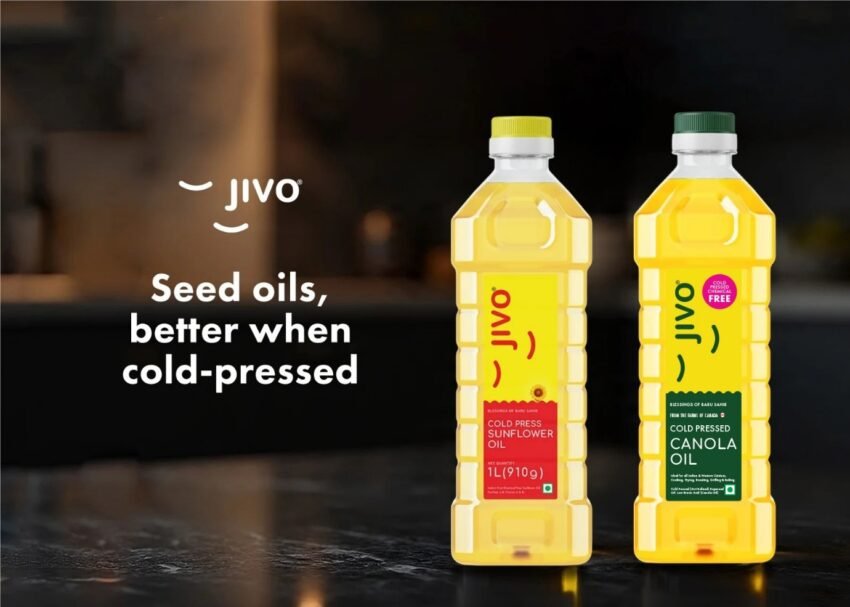There’s a lot of talk about seed oils on the internet, especially on social media, health blogs, and even among nutritionists. Some claim seed oils are unhealthy while some advocate them to be healthy. Confusion arises as influencers and public figures like Robert F. Kennedy Jr. are tagging seed oils as “toxic.” Let’s understand what exactly lies behind such claims. We’ll explore what seed oils are, their health impacts, and how to use them wisely, with a special focus on high-quality cold-pressed oils. Whether you’re cooking a hearty Indian curry or a light salad, this blog will help you make informed choices with the best cooking oils in India.
What Are Seed Oils?
Seed oils are cooking oils made by extracting oil from the seeds of plants. Some of the most commonly used ones are canola, sunflower, soybean, corn, cottonseed, safflower, grapeseed, and rice bran oil. Unlike traditional fats such as ghee or butter, seed oils gained popularity in the 20th century because they were cheaper, stayed fresh for longer, and could be used in many ways. Today, you’ll find them almost everywhere, in fried foods at restaurants, packaged snacks, salad dressings, and even protein bars. Their mild taste and high smoke point make them a go-to choice for frying, baking, and sautéing, both in Indian kitchens and around the world.
So why are they debated? The main concerns come from how these oils are processed and their high omega-6 fatty acid content. Some believe they may lead to inflammation, heart problems, and other health issues.
Why Are Seed Oils Criticized?
The debate over seed oils kicked into high gear around 2018, fuelled by social media influencers, podcasters like Joe Rogan, and health advocates like Paul Saladino. Some even call a group of oils the “hateful eight,” alleging they’re linked to obesity, diabetes, heart disease, and cancer. The main criticisms boil down to two points:
Processing Methods: Most seed oils are refined using high heat and chemical solvents like hexane to extract maximum oil and extend shelf life. Critics argue this strips away nutrients and leaves harmful residues. While trace chemicals may remain, studies confirm they are at safe levels, well below any toxic threshold.
Omega-6 Fatty Acids: Omega-6 fats are mainly found in seed oils, especially linoleic acid. Our body needs them for important functions like cell growth and supporting the immune system. The problem happens when we eat too much omega-6 compared to omega-3, which can create an imbalance and possibly lead to inflammation. The key is balance—it’s not about cutting out omega-6 fats, but making sure you also include enough omega-3s.
A lot of fear around seed oils oversimplifies the issue. For example, when people stop eating seed oils and feel healthier, it’s often because they’ve also cut down on ultra-processed foods like chips, cookies, and fast food, which are loaded with sugar, salt, and additives. In many cases, the oil isn’t the main problem, it’s the overall diet and how the oil is used.
What Does Science Say About Seed Oils?
Are seed oils bad for you? The science offers a balanced perspective. Seed oils are mostly unsaturated fats, monounsaturated and polyunsaturated, which are considered heart-healthy. According to the American Heart Association (AHA), replacing saturated fats (like butter or coconut oil) with unsaturated fats from seed oils can lower bad cholesterol (LDL) and reduce heart disease risk. A 2019 study from Johns Hopkins Bloomberg School of Public Health, led by researcher Matti Marklund, analyzed data from over 68,000 people and found that higher blood levels of linoleic acid (from seed oils) were linked to lower risks of heart attacks, strokes, and type 2 diabetes.
The inflammation argument also needs a closer look. Omega-6 fats are not inherently “pro-inflammatory.” They play a role in healthy inflammation, like when your body heals a cut or fights an infection. The issue arises when your omega-6 intake far outweighs omega-3, which is common in modern diets heavy on processed foods. A 2020 study by Sarah Berry at King’s College London found no significant inflammation increase from seed oils in controlled trials. The solution? Add omega-3-rich foods like salmon, chia seeds, or walnuts to your diet rather than banning seed oils.
Experts like Julia Zumpano, a registered dietitian at the Cleveland Clinic, emphasize moderation. She notes that seed oils are safe but advises choosing unrefined or cold-pressed versions to retain nutrients and avoid processed foods where oils are overused. In a publication by Harvard Health, reviewed by Dr. Christopher P. Cannon, also supports using seed oils wisely for heart health, debunking myths about their toxicity.
The FDA and FSSAI (Food Safety and Standards Authority of India) classify seed oils as safe for consumption, even in refined forms. The FSSAI-compliant cooking oils ensure safety and quality, making them reliable for Indian households.
Seed Oils in Everyday Cooking
Seed oils are widely used because they are very versatile. For example, canola oil has a high smoke point of about 204°C, which makes it perfect for frying snacks like pakoras or for tempering spices. Sunflower oil is light in flavour, making it a great choice for baking or sautéing vegetables without overpowering their taste. Soybean oil is commonly used in Indian restaurants because it is affordable and has a neutral flavour. These oils are often the best cooking oils in India for their ability to handle high-heat cooking without breaking down.
However, not all seed oils are created equal. Refined oils are more processed, which can reduce nutrients like vitamin E or antioxidants. Cold-pressed or unrefined oils, on the other hand, are extracted without chemicals or excessive heat, preserving their natural goodness. They might cost a bit more, but they’re worth it for health-conscious cooks looking for nutritional and best cold-pressed oils in India.
The real health impact comes from how you use these oils. Deep-frying repeatedly with the same oil can create harmful compounds, regardless of the oil type. Overusing oils in processed snacks or restaurant meals can also tip your diet toward unhealthy territory. The trick is to use seed oils in moderation, pair them with whole foods, and balance your omega-6 and omega-3 intake.
Tips for Using Seed Oils in a Healthy Way
To make the most of seed oils without falling into the trap of misinformation, try these practical tips:
- Choose Wisely: Opt for cold-pressed or organic seed oils when possible. They retain more nutrients and skip harsh chemicals. Look for best cold-pressed oils in India for quality assurance.
- Balance Your Fats: Include omega-3 sources like fatty fish, flaxseeds, or walnuts to counterbalance omega-6 from seed oils. Aim for a 4:1 or lower omega-6 to omega-3 ratio.
- Limit Processed Foods: Cut back on packaged snacks, fast food, and ultra-processed meals where seed oils are often overused alongside sugar and salt.
- Cook Smart: Use oils for light sautéing, roasting, or drizzling over salads rather than heavy deep-frying. Store oils in cool, dark places to prevent oxidation.
- Read Labels: Check for FSSAI-compliant cooking oils to ensure safety and quality standards, especially for Indian brands.
By following these steps, you can enjoy the benefits of seed oils without worrying about the myths. They are not the enemy, poor dietary habits are.
Best Seed Oils: Jivo’s Cold-Pressed Canola and Sunflower Oils
When it comes to choosing high-quality oils, Jivo’s Cold-Pressed Canola and Sunflower Oils stand out as some of the best cooking oils in India. These oils are crafted with care, using a gentle cold-pressing process that avoids harsh chemicals and high heat, preserving the natural flavour, aroma, and nutrients of the seeds. This makes them a top pick for health-conscious cooks looking for nutritional and best cold-pressed oils.
Jivo Cold-Pressed Canola Oil
Jivo’s Canola Oil is one of the best cooking oils in India known for its health-enhancing properties. With only 7% saturated fat, the lowest among common cooking oils like sunflower (9%) or olive (14%), it’s packed with monounsaturated and polyunsaturated fats that support cholesterol management and cardiovascular health. It also contains omega-3 fatty acids, which help balance the omega-6 content, making it a great choice for reducing inflammation risks. Its high smoke point (204°C) makes it perfect for Indian cooking styles, from frying crispy samosas to preparing light salad dressings. Moreover, it’s free from trans fats and artificial additives, ensuring purity in every drop. As one of the FSSAI-compliant cooking oils, Jivo Canola Oil meets strict safety standards, giving you confidence in its quality.
Jivo Cold-Pressed Sunflower Oil
Jivo’s Sunflower Oil is also a popular cooking oil in India, loaded with vitamin E and A, which act as powerful antioxidants to support skin health and boost immunity. Its rich omega-6 content provides energy and nourishment, making it ideal for active lifestyles. With a light, nutty flavour, it’s versatile for roasting vegetables, grilling paneer, or even baking healthy muffins. Like its canola counterpart, it’s cold-pressed to retain maximum nutrients and is free from harmful chemicals, aligning with the demand for best cold-pressed oils in India. Whether you’re cooking a spicy curry or a quick stir-fry, Jivo Sunflower Oil adds a healthy and delicious touch to your meals.
Why Choose Jivo’s Best Cooking Oils in India?
Jivo’s commitment to quality sets it apart. Both oils are sourced from premium seeds and processed sustainably, ensuring eco-friendly practices. They’re perfect for Indian households looking to elevate their cooking with nutritional cold-pressed oils that taste great and support wellness. Whether you’re managing heart health, aiming for weight balance, or simply want cleaner ingredients, Jivo’s oils deliver. Their FSSAI certification guarantees safety, while their cold-pressed extraction ensures you are getting natural nutrients. Add Jivo to your kitchen for a healthier, tastier cooking experience.
Conclusion: Making Sense of Seed Oils
Seed oils are marked as evil, but they aren’t. The science is clear on this as to when used in moderation and as part of a balanced diet, especially if they are cold-pressed, they may help support heart health, lower cholesterol, and add flavour to your meals. The real issue lies in over consuming processed foods and neglecting omega-3-rich foods, not in the oils themselves. By choosing nutritional oils like Jivo’s Cold-Pressed Canola and Sunflower Oils, you can enjoy the best cooking oils in India without compromising your health. Focus on whole foods, balance your fats, and cook with care. Seed oils, if cold-pressed, can be a delicious and a nutritious part of your kitchen.

